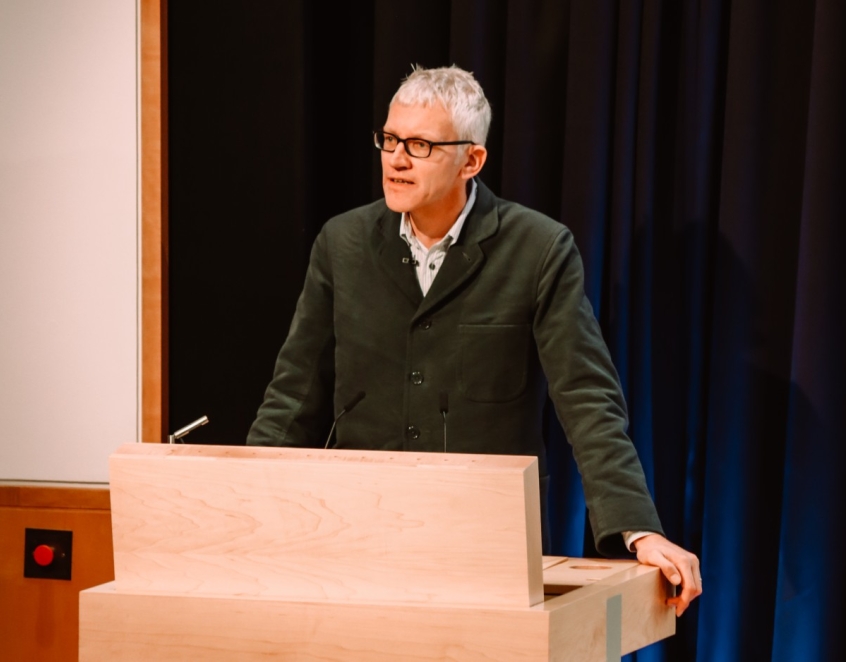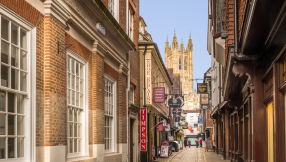
Tom Holland has spoken movingly about the profound impact of witnessing firsthand the suffering of Christians in other parts of the world.
The historian and "Dominion" author was guest speaker at the inaugural 'Perspectives' lecture held by Open Doors, a charity supporting persecuted Christians, at the British Library on Wednesday night.
Asked about how Christians in the West could "de-Westernise", he said one way was to "think about Christians in lands beyond the West" and "the perspectives on Christianity they may be able to offer us".
Conversely, on the question of how Westerners could "re-Christianise", he said the same held true and that he had experienced this himself after visiting northern Iraq where he saw devastating scenes of persecution against Christians and Yazidis by the Islamic State.
Holland said the impact of visiting these places "brought alive all kinds of Christian teachings [and] Christian modes of life" that he had only previously "understood in the abstract".
"The themes of Christian history, the cycles of persecution, seemed vivid in a way that they simply hadn't done before," he said.
In particular, his understanding of the crucifixion was transformed by visiting places where Yazidi men had been crucified by the Islamic State.
This, he said, had made him appreciate in new ways "the reality of a world in which the cross serves as a symbol of the power of the powerful to torture and torment and kill the powerless when instinctively to me, as someone who grew up in a fundamentally Christian society, the cross served as the opposite.
"The cross served as a reassurance that actually it is the powerless who triumphs over the powerful, it's the slave who triumphs over the master, it's the man sentenced to the cross who triumphs over the apparatus of state that has sentenced him," he said.
"We have to think ourselves into the sandals of the Romans to understand and properly appreciate just how unfathomably weird it is that today the cross of all things should be perhaps the most instantly recognisable cultural symbol that any human culture has developed, and it symbolises not power but the opposite, that the victim will triumph."
Holland then suggested that today's Church should embrace the suffering, humiliation and "strangeness" of the crucifixion as it would have appeared to early believers.
"We've kind of become culturally desensitized to it," he said.
He also suggested the Church should capitalise on the spiritual and 'supernatural' dimension of the Christian faith "rather than being slightly embarrassed about it and only talking about the kind of things that you'd hear on a Liberal Democrat party political broadcast, a kind of Thought for the Day thing".
"I think that the churches have to lay claim to everything that is the weirdest, most counter cultural, most peculiar. Don't dump all the stuff about angels. Major on that," he said.
Holland argued this in turn could help to re-establish the connection between the West's Christian heritage and its strong emphasis on human rights.
"What the rise of China and of other civilisational powers is doing is to remind us that the concept of human rights is one that emerged in a very specific cultural matrix, which is a Christian one, and that therefore if you want to believe in human rights, you have to believe," he said.
"It takes a leap of faith to believe there are things called human rights, just as much as it takes a leap of faith to believe that the Lord Jesus Christ rose from the dead. They're both beliefs."
He added, "When people are reminded that the core beliefs that are fundamental to how people morally define themselves are rooted in faith, this reopens the possibility for secularists to recognise that they have not somehow emancipated themselves from the need for faith."
Returning to the question of how Westerners might be re-Christianised, he spoke of the "need to be reminded that our gut instincts are deeply, deeply rooted in this most culturally influential of all stories".
"This is the wellspring of it," he said.
"But also I think if Christians in the West want to de-Westernise, Christians in the West need to remind themselves of how strange what they believe is.
"It's so odd, it's so peculiar, it's so haunting, and that sense of the strangeness, I think, is what is missing perhaps both in the churches and in the kind of humanist, secular, agnostic world beyond that is nevertheless completely Christian in its assumptions and attitudes.
"And that, I think, is where the sufferings of Christians in countries beyond the West can help, whether you are a Christian or not a Christian. The spectacle of people willing to suffer and perhaps to die for this story, I think, reanimates it with a sense of this primal strangeness."













